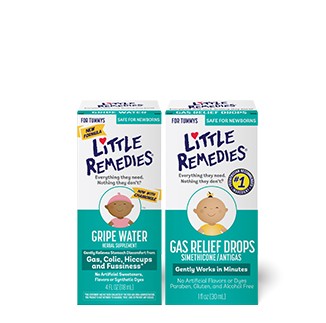
One of my funniest parenting stories is about my infant son unexpectedly spitting up on his grandpa – my father. My dad was around my boys a lot when they were babies and he was always helpful when we needed an extra hand. In this instance, he was burping my son on his shoulder and my son let out a huge belch! My whole family laughed because it was such a loud sound from such a small baby.
My mom instincts told me that I needed to check for spit-up, but I couldn’t find it anywhere. We were all baffled until my dad reached into his back pocket for his handkerchief. My son had magically spit up over my dad’s shoulder and directly into my dad’s pant pocket! Today my son is 10-years-old and we still laugh about it.
Sure, it’s funny now, but spit-up can be a little bit alarming with a new baby. Many newborns spit up what seems like a large amount of milk and it happens unexpectedly and sometimes forcefully. If you’re concerned about the frequency or the amount your baby is spitting up, here are a few spit-up facts to think about:
Muscles Still Developing
You have a muscle or valve that keeps food in your stomach in called an esophageal sphincter. It’s located between your esophagus and your stomach. In newborns, this valve is still developing and it’s not as strong as it will be when they are bigger. For this reason, babies spit up, especially if they eat too much.
Not As Much As You Think
It’s common to think “a lot” of spit up is coming out of your baby’s mouth, but sometimes it’s really not much at all. Even the most mathematical parent tends to overestimate the amount. It’s usually less than a tablespoon. If your baby is thriving and gaining weight, the amount of milk she loses when she spits up is not interfering with her health.
Don’t Top Off
Since overfeeding can lead to tummy woes in newborns, if your baby spits up towards the end of a feeding, you don’t need to feed her again to make up for what she lost. She may be fussy and cry when she spits up, but it’s probably not because she’s hungry, so resist the urge to feed.
Time To Digest
Does the childhood adage, “Wait an hour before you go swimming or you’ll get cramps!” sound familiar? It’s kind of an outdated joke these days, but the reality is it’s a good idea for baby not to jump, bounce, wiggle and swing too much with a full tummy. Letting her sit upright for about 30 minutes after a meal helps her digestion process and eases the triggers that cause spitting up. Gravity is working for you!
Baby on Her Back
It’s pretty commons for newborns to doze off during a feeding. If this happens, burp them as you would normally do and put them to sleep on their side or back. Doctors don’t recommend putting a baby to sleep on her tummy, even if you think it may prevent spitting up.
Angle The Mattress
If you have concerns about your baby spitting up while she’s asleep, you can angle the mattress to raise her head. You can put a wedge or a small pillow under the mattress – never directly under her head – and lift her to a 30-degree angle. This way the subtle tilt in the mattress is elevating her head and helping gravity do its magic to keep her comfortable.
What's the best way to burp your baby? Click here for Best Burping Techniques 101.









